Her successor-in-waiting to lead Europe’s biggest economy, Finance Minister Olaf Scholz, as well as France’s President Emmanuel Macron and Italy’s Prime Minister Mario Draghi have all been touted as candidates to take over Merkel’s mantle as the leader of Europe.
But analysts warn that none may be immediately capable of assuming the task, given the European Union’s myriad of unresolved challenges — ranging from an internal dispute over the rule of law to the risk of geopolitical marginalisation, to the after-shocks of Brexit.
Lauded for her steady hand in steering the bloc through crisis after crisis, Merkel, who will quit politics when Scholz is officially elected chancellor in December, is leaving the stage while still immensely popular at home and abroad.
During her 16 years in office, she has at times been vilified for stubbornly sticking to her plans despite her partners’ protests, while at others, praised for holding the line.
“Angela Merkel is perceived as one of the most significant politicians in a generation, as the de facto leader of the European Union and the ‘leader of a free world’,” wrote Sebastian Reiche of the IESE Business School in Spain.
In a recent survey of the think-tank European Council on Foreign Relations (ECFR), 41 percent of EU citizens said that if they could, they would vote for Merkel. Comparatively, only 14 percent picked Macron.
READ ALSO: ‘Eternal’ chancellor: Germany’s Merkel set to hand over power
‘Sovereign Europe’
Yet critics say Merkel’s “stability” politics of sitting out crises and prioritising economic interests even in dealings with Russia or China have only crimped European integration and fuelled inertia.
Her exit may well open the door for the other half of the European engine — Macron — to slide into the driver’s seat.
The stars appear to be aligning: France holds the EU’s presidency from January, and with a Social Democrat-led coalition arriving in Germany, even the age-old German adage of budgetary rigour appears to waver as Europe’s biggest economy seems bent to spend its way out of the pandemic.
Likewise on defence, Germany, once comfortably ensconced under the “US shield”, is no longer so sure after Donald Trump’s presidency forced the political classes in Berlin to bury their old certainties and begin a mindset shift.
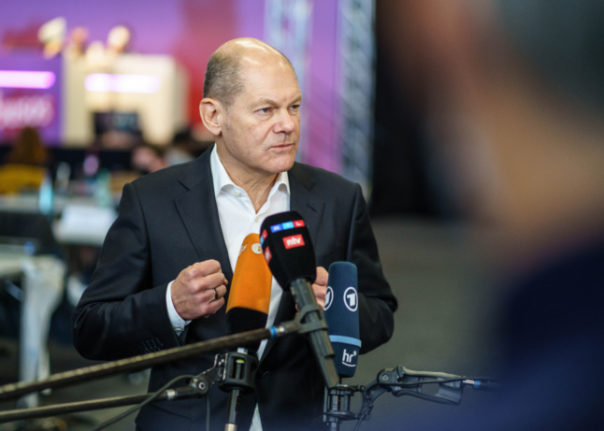
Olaf Scholz, Germany’s Chancellor-in-waiting, speaks at a meeting with the young socialists (Jusos) on Saturday, November 27th. Photo: picture alliance/dpa | Frank Rumpenhorst
Illustrating the change, Scholz’s incoming coalition of his Social Democrats, ecologist Greens and liberal FDP declared in their agreement that it was their “task as an economically strong and populous country in the heart of Europe to enable, promote and advance this sovereign Europe”.
Merkel’s departure “can allow France’s vision of a powerful Europe to develop, it is an ambition that Macron has championed since his arrival in power,” said Alexandre Robinet-Borgomano of the Institut Montaigne.
“Leading the charge” for Merkel’s mantel is Macron, wrote Helen Thompson of Cambridge University, though his “self-proclaimed attempts to give the European Union an explicitly political purpose have been frustrated so far”.
READ ALSO: ‘France loves you’ – Macron hosts Merkel for farewell visit
‘Merkelism’ is out
Amid the changing of the guard in Berlin, Macron recently signed a new bilateral cooperation treaty with Draghi.
Even if the ambitious 43-year-old president has defended himself by saying that France is not seeking to replace French-German relations, the timing of the pact comes as the EU is realigning itself after Brexit.
The French leader however faces an election in 2022, with the far-right posing a challenge.
No matter the outcome, France could be tied up with domestic politics for a while, stifling its capacity to develop a grand vision for Europe.
Scholz, 63, an experienced politician who has served in two of Merkel’s cabinets, could seize the chance as Merkel’s heir.
But analysts warn that times have changed, and more “Merkelism” might not do for the new era.
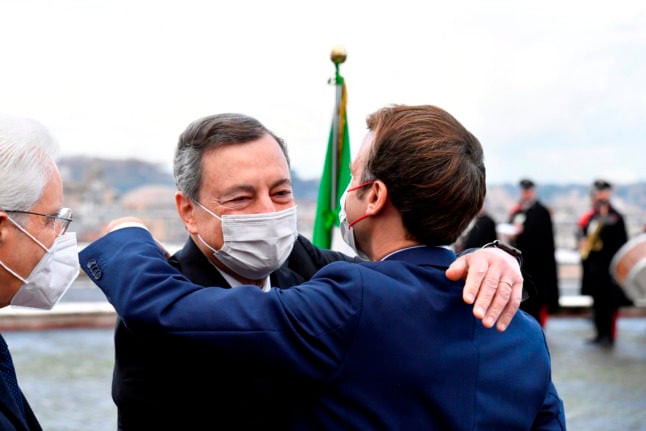
French president Emmanuel Macron hugs Italian Prime Minister Mario Draghi following the signing of a new treaty on November 26th. Photo: picture alliance/dpa/AFP POOL/AP | Alberto Pizzoli
“The policy of remaining neutral and avoiding tough solutions to Europe’s predicaments does not seem to be a viable approach to the challenges ahead,” wrote Piotr Buras and Jana Puglierin of the ECFR.
“Merkelism is unlikely to outlive Merkel… because the EU will need a more visionary and courageous Germany to strengthen its foundations and defend its place in the world.”
READ ALSO:
- Omicron variant poses ‘high to very high’ risk to Europe: EU health agency
- Countries across Europe impose curbs to slow new Covid-19 wave
The jury is still out on whether Scholz, who styled himself as a Merkel mimic — down to her rhombus hand gesture — during the German campaign, will step out of her shadow to take a more radical path.
With both key European players likely needing time for realities to shake down, one new pole of stability has emerged in the once debt-wracked south.
‘Stasis’?
Dubbed “Super Mario” during his stint at the helm of the European Central Bank, Draghi has brought stability to a country that was once a byword for political upheavals and scandals.
Draghi “could fill the vacuum left by Angela Merkel as a consensus builder in the European Council,” Nicoletta Pirozzi of think-tank Istituto Affari Internazionali in Rome told AFP.
“Also, compared to Merkel’s cautious approach, he could inject a new dynamism in key sectors of European integration, from the reform of economic governance to foreign policy and defence, in cooperation with France and the new German government.”
But Pirozzi noted that much will hinge on whether the Italian leader, 74, does manage to successfully implement the EU’s economic recovery plan.
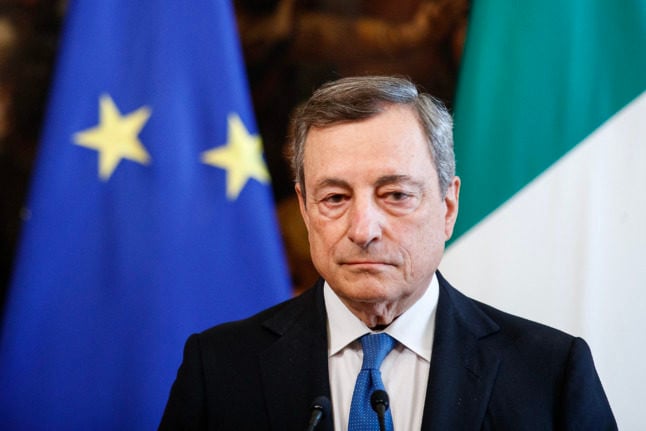
Italy Prime Minister Mario Draghi holds a press conference with Angela Merkel on October 7th, 2021. Photo: picture alliance/dpa/LaPresse via ZUMA Press | Roberto Monaldo
Italy’s presidential election in early 2022 “could radically change the picture” as Draghi is also touted as “one of the most credible potential candidates” in that race.
Until a new leader emerges, some analysts see a sombre future for the bloc.
“Europe might be heading towards a period of uncertainty and potential weakness,” warned Reiche.
Likewise, Thompson was pessimistic.
“Hamstrung by the rivalry between America and China, and deeply divided internally, the European Union inhabits a world different from that of the years of Ms. Merkel’s ascendancy,” she wrote.
“The reality, starkly stated, is that neither the (new) German chancellor nor the French government can lead Europe. “And in the absence of leadership, Europe is headed for one thing — stasis.”
By Yacine Le Forestier

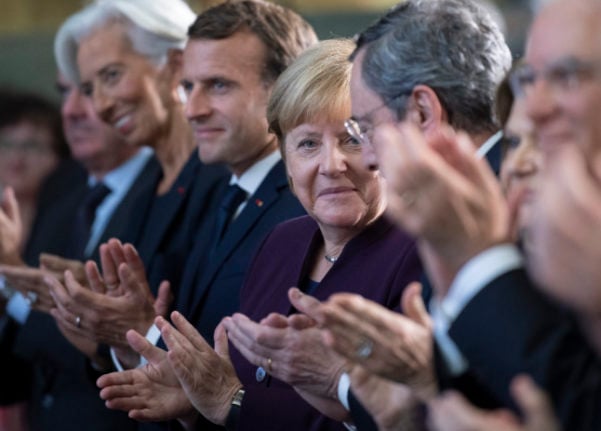
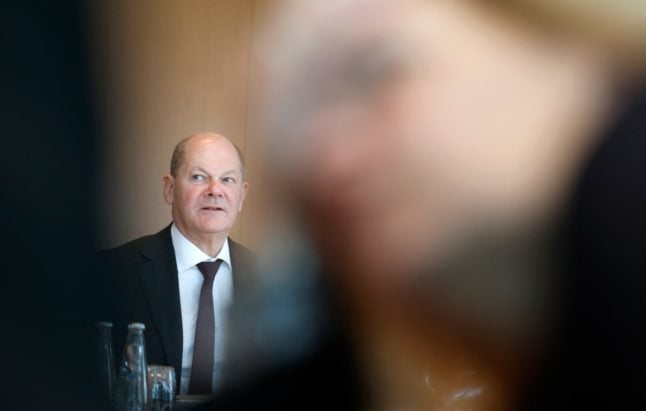
 Please whitelist us to continue reading.
Please whitelist us to continue reading.
“Likewise on defence, Germany, once comfortably ensconced under the “US shield”, is no longer so sure after Donald Trump’s presidency forced the political classes in Berlin to bury their old certainties and begin a mindset shift.”
It could help them if they actually paid the agreed to share.